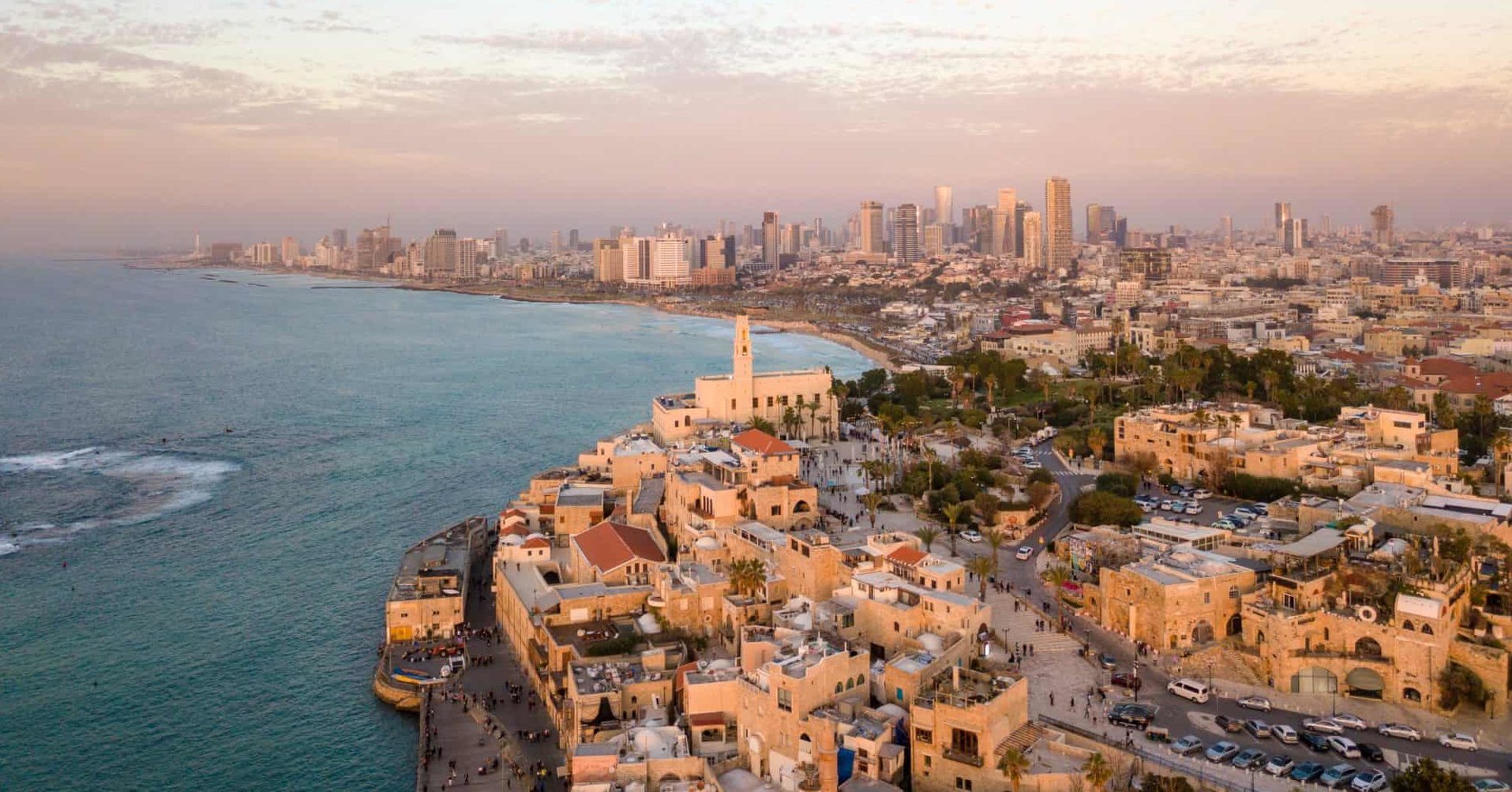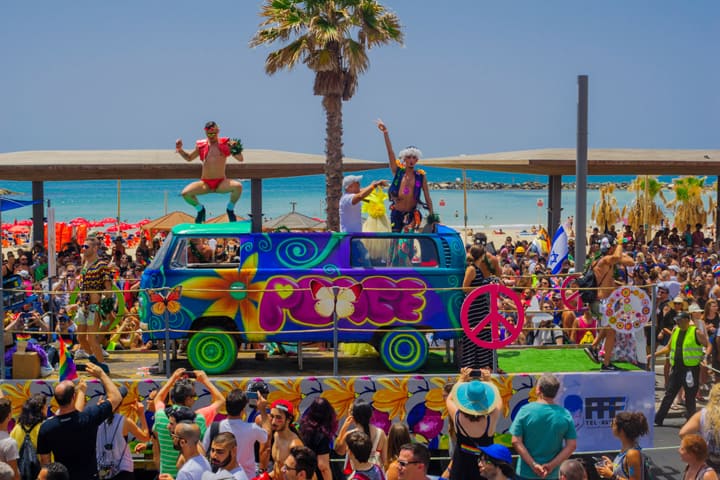
Gay Tel Aviv City Guide
Planning a trip to Tel Aviv? Then our gay Tel Aviv city guide page is for you.

Tel Aviv | تل أبيب תֵּל־אָבִיב
Tel Aviv is the largest metropolitan area in Israel, with population of less than half a million and a land area of 52 km². The city is located on the Israeli Mediterranean coastline. Its White City, a UNESCO World Heritage Site since 2003, is home to the world's largest concentration of Bauhaus buildings.
Tel Aviv is also known as a "party capital" and "the city that never sleeps" due to its 24-hour culture and a thriving nightlife.
Gay Rights in Israel
Gay rights in Israel are the most developed in the Middle East. The country originally inherited British legislation criminalising gay sex but the law was never enforced. The ban was repealed by the Knesset national assembly in 1988. The age of consent is the same for everyone at 16 years of age.
Same-sex partners can form a type of common law marriage that provides legal recognition in respect of many financial and taxation matters. Marriages and civil partnerships formed abroad are fully recognised. The LGBT community is protected by anti-discrimination laws. Israel remains the only country in the Middle East to provide this legal protection.
Today, Tel Aviv is recognised as one of the most gay-friendly cities in the world and the gay capital of the Middle East. It is renowned for its annual Pride parade, lively scene and fabulous gay beach.
 Tel Aviv Gay Pride
Tel Aviv Gay Pride
Gay Scene
There is no 'gay village' in Tel Aviv. The scene is embedded into the city's culture with gay venues scattered all over town. There is something for everyone when it comes to partying.
In addition to specifically gay venues, many regular bars and clubs will host occasional 'gay nights'. This is a late-night city. Most gay bars in Tel Aviv will not get busy until midnight and dance parties start to fill up from 2am onwards.
Tel Aviv has a few steamy gay saunas and cruise clubs. Guys holding hands on the street is quite acceptable. The freedom to have fun and be fabulous makes this vibrant city a great place for gay tourists.
The Gay Beach in Tel Aviv is a popular destination for locals and foreigners, and Tel Aviv's Pride event gets bigger and better every year.
Experiencing Tel Aviv
Tel Aviv is a relatively small city with interesting neighborhoods that each have their own distinct identity. The city has a vibrant nightlife.
https://www.youtube.com/embed/6JL2ceWzun8
Getting to Tel Aviv
The Ben Gurion International Airport (TLV) is a world-class airport and has one of the world's largest duty-free shopping malls. It is generally recognised as one of the most secure in the world. Most European, Middle Eastern and many Asian airlines offer direct flights.
The airport is located 15km from the city near the town of Lod. You can take a train direct from the airport to the city which costs between 11-15 NIS. Metered taxis are available 24 hours and are the most convenient way to get to city center, with a typical fare in the area of 120 NIS (around $30).
An alternative to expensive taxis is the sherut, a shared taxi service unique to Israel which pairs people up who are going the same way. You can take a sherut into the city centre of Tel Aviv and to further away destinations across the country.
Getting around Tel Aviv
By bus
An inexpensive, modern bus network operates throughout the city. Most bus drivers speak English and are usually happy to help with information about your destination and when to jump off. Get a RAVKAV card which unifies all carriers in the country.
By taxi
The easiest way to commute in the city. Taxis are obligated to use a meter - insist that it is turned on. Tipping is not expected. In addition to normal taxis, there are 6-12 person van-sized taxis that supplement some bus routes. This alternative is often faster, slightly cheaper, and more frequent than taking a bus.
By bicycle
Tel Aviv's flat and coastal geography, mild weather and a growing number of cycling paths make cycling a great way to get around the city Several shops offer bicycle rental.
Things to See & Do in Tel Aviv
- Palmach Museum - interactive history museum by appointment only.
- Neve Tzedek - Jewish neighbourhoods outside the city of Jaffa, consisting of narrow, winding streets, located not far from the sea.
- Tel Aviv Museum of Art - contains a collection of art including European works from the 16th-19th centuries, Impressionism, Post-Impressionism and 20th Century Modernism.
- Nachalat Binyamin Pedestrian Mall - street market located near the Carmel Market with many shops, cafés and restaurants.
- Old Jaffa - one of the oldest ports in the world with famous flea market nearby.
- Dizengoff Street - Tel Aviv's main artery filled with busy pedestrian traffic, shops, cafés, art galleries, boutiques and bars.
- Florentin - former working-class neighborhood with the city's largest concentration of Bauhaus architecture.
- Museum of the Jewish Diaspora - located in Tel Aviv University, this museum chronicles the story of the Jewish people of Israel over the last 2,500 years.
- Rothschild Boulevard - trendy street with a lot of Bauhaus architecture, restaurants and cafés.
- Tel Aviv Performing Arts Center - a modern architecture showcasing opera, music and performing arts.
Read More: Things To Do In Tel Aviv.
Where to Stay in Tel Aviv
Tel Aviv has great selection of hotels. Most gay travelers stay near the Hilton Beach area and the waterfront. For our list of some of the best hotels for gay travelers, visit the Tel Aviv Mid-Range + Budget Hotels or Tel Aviv Luxury Hotels pages.
When to Visit
Tel Aviv has pretty good weather all year round with hardly a day without sunshine.
Technically, it has a Mediterranean climate with hot summers (June to August), cooler and wetter winters (Dec-Feb) and unpredictable springs (March-May) and autumns (September to November). Heatwaves are not uncommon in spring.
Visa
Israel has visa exemption agreements with several countries. You can check here to see what visa applies to you. Most are eligible for the B2 Tourist Visa, valid for three months, issued on arrival.
Nationals of other countries without such agreements must obtain a visa at the nearest Israeli Embassy in their country before travelling to Israel.
Money
The currency used in Israel is the New Israel Shekel (NIS) or shekel for short. Travellers can bring in any amount of local or foreign cash along with traveler's cheques or credit cards.
Foreign currency can be exchanged at the airport, banks, post offices, most hotels or licensed exchange agencies in large cities. A passport is required when exchanging traveler's cheques.
Visa and MasterCard credit and debit cards can be used to withdraw cash at banks or at ATM's.
Tipping
You will be expected to tip generously in cafés, restaurants and bars, at least 12%-15%.
The Working Week
The working week in Israel is Sunday to Thursday. Most shops and businesses are closed Friday afternoon and all day Saturday.
Tourist Information Center
46 Herbert Samuel Sr., corner of 2 Geula St., Tel Aviv Promenade
Tel. +972 3 516 6188
Hours: Sunday to Thursday: 09:30 - 17:30, Friday: 09:30 - 13:00
Emergency Numbers
Police 100
Medical emergency / Ambulance 101
Fire Department 102
Join the Travel Gay Newsletter
Have we got something wrong?
Are we missing a new venue or has a business closed? Or has something changed and we have not yet updated our pages?Please use this form to let us know. We really appreciate your feedback.